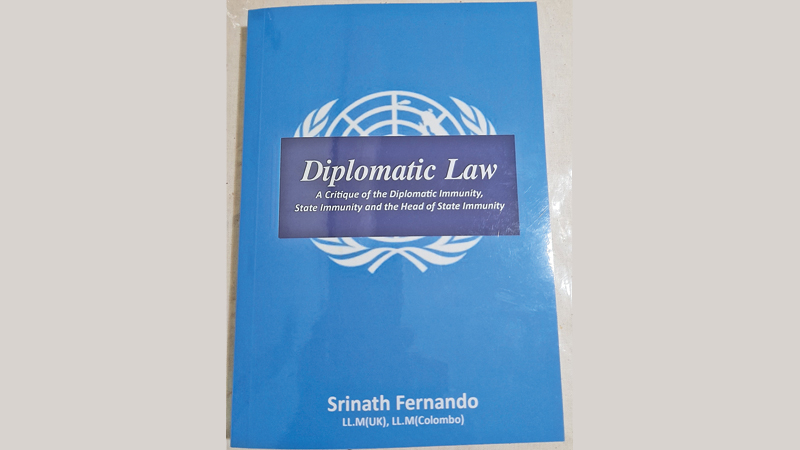Title: Diplomatic Law: A critique of the Diplomatic Immunity, State Immunity and the Head of State Immunity.
Author: Srinath Fernando
As the title indicates, this book has taken a holistic approach and aimed at disentangling the often confused diplomatic immunity issues where there are different types of immunity. The author, Srinath Fernando LLM(UK), LLM(Colombo) Post Graduate Diploma in Diplomacy and World Affairs (Bandaranaike International Diplomatic Institute – BIDTI) is a Public Affairs Consultant and Editor /Publisher of KC The King’s Counsel Magazine – an online law magazine dedicated to advancing the English common law tradition. He has built on his thesis prepared for BIDTI post graduate diploma under the research supervision of Dr. Sarala Fernando – a former Ambassador.
Fernando has provided many snippets on diplomatic affairs and has extensively quoted and provided materials taken from Wikileaks where there is a wealth of documents. Wikileaks documents offer the true picture of diplomatic practice deep inside an embassy, even through sources are stolen in breach of the US law. Fernando argues that there is “very little understanding on how diplomatic immunity, state immunity, Head of State immunity and the concept of ‘Universal Jurisdiction’ are applied by foreign countries’.
He has sought to address these issues comprehensively in the book. He says, “The global political economy and global power projections have distorted the lofty concepts such as ‘Universal Jurisdiction’ and it is clear that there is no uniformity in applying this concept by responsible states.
The Vienna Convention on Diplomatic Relations too has been abused by countries for their narrow political agendas. The Convention is meant to strengthen the effective conduct of foreign relations between states. The Convention has also been abused by diplomats for collateral purposes such as to engage in promoting private business and criminal activities, or illegal trades using the facade of diplomatic immunity. The governments too should be held accountable as there have been many instances of diplomats being used for intelligence gathering purposes.
Fernando said, ‘There should be a reporting mechanism or a review of the application of the Convention by the member states of the United Nations and to verify if there have been any intentional transgressions of the Convention. The States that intentionally undermine the ambit of the Convention must be held accountable. The book provides insights into the workings of the diplomatic law and on how diplomatic immunity is defined, described, and invoked by nation states’.
It is a must read for public officials and students interested in an honest reckoning of the function of diplomatic law in a web of different meanings attached to the functional immunity. The book provides in the annexures the controversial issue surrounding the arrest of Italian marines on board MV Enrica Lexei and how it propelled into a diplomatic row between India and Italy. The book also provides the full case law determination by the House of Lords – NML Capital Ltd v. Republic of Argentina.









